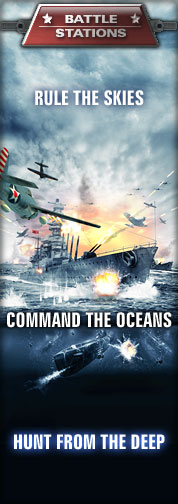(Undo revision 353835 by 68.62.197.205 (talk)) |
|||
| Line 54: | Line 54: | ||
Only good flying and players who always make the most of their carriers will win. There is no real always-win tactic. | Only good flying and players who always make the most of their carriers will win. There is no real always-win tactic. | ||
{{Footer Nav|game=Battlestations: Midway|prevpage=Battle of the Coral Sea (MP)|nextpage=Battle of the Sibuyan Sea}} | {{Footer Nav|game=Battlestations: Midway|prevpage=Battle of the Coral Sea (MP)|nextpage=Battle of the Sibuyan Sea}} | ||
Revision as of 18:11, 3 February 2009
American Objectives
- Sink the enemy carriers
- At least one Allied carrier must survive
Japanese Objectives
- Sink the enemy carriers
- At least one Japanese carrier must survive
This map is essentially the same as Coral Sea but it removes all the other ships and focuses exclusively on the carriers. This battle will obviously be won or lost in the skies.
When attacking, every player must remain coordinated with the others. Single fighter and bomber waves will simply be shot down.
Additionally, while under most circumstances players will always crash-land their units into water to try and save time, this map is one major difference. Due to the map's nature and lack of other methods of attacking, it is imperative that bombers attempt to return to base unharmed, to save them for later. Rarely will this battle ever be extremely short, so keep all your planes alive.
Player Slots
American Slots
- Yorktown (CV) - Hornet
- Yorktown (CV) - Enterprise
- Yorktown (CV) - Yorktown
- Airfield (contains 130 TBD Devastators)
Airfield (contains 12 B-17s)
Shipyard (contains 2 Elcos, 6 PBY Catalinas)
Japanese Slots
- Akagi (CV) - Akagi
- Sōryū (CV) - Hiryū
- Sōryū (CV) - Sōryū
- Akagi (CV) - Zuihō
American Strategy
The Americans have one less carrier, which means they have a less chance overall of winning, since the Japanese only need to destroy three carriers while the Americans have to destroy four. This is mitigated, however, by the presence of an airfield. The airfield, however, can only field Devastators, so ultimately the Japanese have the upper hand in being able to field more fighters than the Americans.
The carriers should start the battle moving. Always try to keep them together so they'll cover each other, and set all personnel to work on water duty, as the major threat here will be torpedoes. Barely anyone deploys dive bombers.
The airfield player can use some pretty nasty tricks with his B-17s. B-17s are next to impossible to shoot down with anti-aircraft fire, and if you sling enough B-17s at an enemy carrier, it will easily go down - especially if you bomb from bow to stern. When deploying B-17s though, always keep them in a large group - their machine guns will cover each other and cause heavy damage to attacking fighters.
The shipyard can do some damage too. Because the biggest threat to the carriers is low-flying torpedo bombers, PT boats can cause some big damage to torpedo bombers, which fly low enough for their triple machine guns to strike.
Alternatively, the Japanese know about your PT boats, but will often discount the presence of Catalinas. You can surprise them with a multi-layered Catalina attack, especially if you send the Catalinas alongside Devastators and Avengers. Combine this with dive bombers and fighters, and the enemy won't know where to shoot.
Japanese Strategy
The Japanese have nothing but carriers, so similar tactics can apply. If the American carriers move away from the shipyard and airfield, you can deploy dive bombers to remove them early. For the first wave though, stick fighters in the air. Don't deploy bombers until you know you have adequate fighter coverage from the other players - do not go into battle alone.
Sometimes it is good to play defencive when you're Japanese and wait until the enemy has expended most their bombers - especially their B-17s. However, most of the times what results is a change of tactics for the enemy, and they will start launching fighters to counter your own. Regardless of tactics, always expect high-flying dogfights in Operation MI.
Be aware of Catalina attacks, as most players discount their presence in favour of Elco PT boats. Catalinas are slow and generally easy targets, so deploy a wing of Zeroes to down the Catalinas. If the enemy decides to use Elcos offensively, you needn't fear much — Elcos are easy targets if not by your aircraft machine guns, by the huge number of anti-aircraft guns on carriers. Just don't get torpedoed.
It is imperative that the carriers stick together, especially when B-17s come. Get the carriers broadside to minimize the damage the B-17s can cause. While the enemy will bunch them together to provide mutual support there are three options to ensure kills with little damage to the fighters: attack head-on then dive and turn around, from in front and dive on them, or from below. The enemy doesn't have a lot of B-17s, so if you can shoot all of them down, you'll remove another airfield from the enemy.
Most players choose to ignore the shipyard, as they generally don't perceive it as a threat. It can still be a thorn in your side if it uses PT boats defensively, so you may want to get rid of it early. Regardless, sinking a carrier is far more important.
Only good flying and players who always make the most of their carriers will win. There is no real always-win tactic.
